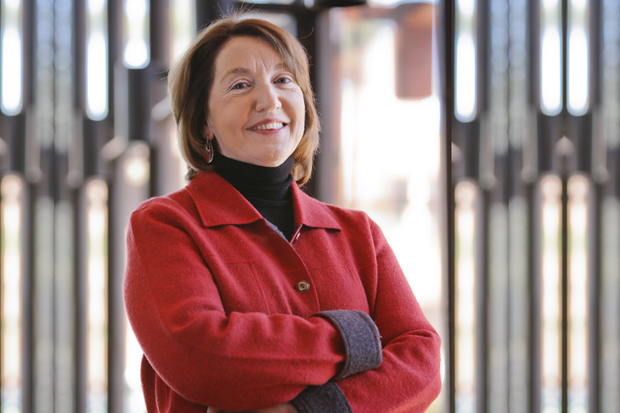JFK’s other civil rights effort: protecting the rights of people with intellectual disabilities
 Photo/Mike Lovett
Photo/Mike LovettEileen McNamara
President John F. Kennedy, whose centennial is being marked this year throughout the Boston area and the U.S., is remembered for many contributions he made in just over 1,000 days in office: the space program, the resolution of the Cuban Missile crisis, his efforts to support civil rights for African-Americans. Less well-known is Kennedy’s contribution to the civil rights of people with intellectual disabilities. The last piece of legislation he signed before his assassination gave the federal government a role in protecting the welfare and civil rights of those Americans for the first time; it was a watershed moment in disability rights.
On October 23, Brandeis, The Heller School for Social Policy and Management and The Lurie Institute for Disability Policy will host a panel discussion titled “JFK and Another Civil Rights Movement: People with Intellectual Disabilities,” to discuss the lasting impact of that moment on the lives of people with intellectual disabilities today. The event will be moderated by Eileen McNamara, Professor of the Practice of Journalism, Pulitzer Prize winner and former Boston Globe columnist.
McNamara spoke with BrandeisNOW about how the legislation changed the landscape for people with intellectual disabilities and their families:
BrandeisNOW: What would you say was President Kennedy’s biggest contribution to civil rights for people with intellectual disabilities?
Eileen McNamara: When John F. Kennedy was sworn in as president, in 1961, most people with intellectual and developmental disabilities were warehoused in large, Dickensian institutions, isolated from their families and the communities into which they had been born. That began to change, slowly but irreversibly, after President Kennedy signed the Mental Retardation Facilities and Community Mental Health Centers Act on October 31, 1963. The legislation for the first time gave the federal government an active role in addressing the needs of children and adults with intellectual and developmental disabilities who, until then, had relied on their families and inadequate state facilities to meet their basic needs.
BN: Would you say the time was ripe for those changes, or did he have to lead the nation in that conversation?
EN: Those changes were long overdue. For a decade, activist parents had been leading efforts in the states and on Capitol Hill to win funding for special educators to teach their children and for support at home for parents who did not want to institutionalize their children. Their efforts yielded some progress, but real change did not arrive until Kennedy invited the best scientific, legal, educational and medical minds in the country to form a presidential panel to assess the needs of this population, and to map out a strategy for the federal government to help meet them. More than anything, his efforts changed the national conversation. Those with intellectual and developmental disabilities, he said, "need no longer be alien to our affections or beyond the help of our communities."
BN: Can you talk about what role President Kennedy’s family history with intellectual disabilities may have played in his advocacy around this issue?
EN: The Kennedy family's interest in this issue was personal as well as political. Rosemary, the oldest daughter of Joseph P. and Rose Fitzgerald Kennedy, had been born with mild intellectual disabilities. She had lived at home and at boarding schools or with tutors until, at age 23, she underwent a prefrontal lobotomy, surgery that her father had hoped would relieve the mental illness that compounded her disabilities. It proved disastrous for Rosemary, who spent the remainder of her life in the care of the Sisters of Saint Francis at a private facility in Wisconsin.
BN: I know you are working on a book about Eunice Kennedy Shriver. How did her advocacy influence President Kennedy’s policies?
EN: Most Americans know her as the founder of Special Olympics, but it is not hyperbole to say that none of the historic initiatives undertaken during the Kennedy Administration would have happened without Eunice Kennedy Shriver, the president's sister and long the protector of Rosemary. It was Eunice who urged her brother to convene the presidential panel and Eunice who recruited its members. It was Eunice who goaded her brother into creating the National Institute of Child Health and Human Development to focus federal research dollars on understanding the causes of intellectual disabilities. It was Eunice who lobbied Congress to get those bills passed, the last President Kennedy ever signed. For that reason, I called her long-overdue biography - available at a bookstore near you in April - Eunice, The Kennedy Who Changed the World.
Categories: General, Humanities and Social Sciences





